Research Area 1: Influenza and Other Infections of Public Health Significance
Hong Kong, a densely populated city, is an epicentre for emerging infectious diseases. The city provides an ideal location to study the ecology, transmission and public health interventions of emerging viral pathogens, such as the Middle East respiratory syndrome (MERS) coronavirus, Severe Acute Respiratory Syndrome Coronavirus 2 (SARS-CoV-2) and zoonotic viruses with pandemic potential such as the avian and swine influenza viruses. Our integrated multidisciplinary research programme includes internationally recognised expertise supported by the best laboratory and field resources, in Hong Kong and southern China, with a network of excellent international collaborations. Our research programme has eight foci:
- Ecology, evolution and the origin of pandemic and zoonotic influenza, coronaviruses and other important emerging viruses
- Explore ecological factors favouring interspecies transmission and the drivers of the emergence of pandemic influenza and other viruses
- Conduct animal influenza (e.g. H5N1 and H7N9) and other emerging virus surveillance to understand virus evolution and zoonotic events
- Integrate viral genetic information with viral functionality to identify critical molecular signatures to facilitate identification of field isolates
- Take advantage of the city environment and the encompassing urban and rural landscape of southern China
- Efficient public health interventions for the control of influenza, coronaviruses and other emerging viruses
- Transmission control within communities
- Interventions to control viral disease epidemics
- Epidemiology and control of influenza viruses and coronaviruses
- Novel “universal” vaccine strategies for influenza
- Development and spread of antimicrobial resistance
- Monitor antimicrobial resistance (AMR) bacteria using One Health approach
- Influenza, coronaviruses and other emerging virus pathogenesis
- Viral and host factors related to virus pathogenesis, replication and virus-host interactions
- Viral tropism
- Innate and adaptive host immune responses
- Viral determinants of interspecies transmissions
- Acute lung injury and novel therapeutic options
- Modes of respiratory transmission and transmission dynamics
- Large community-based studies of aerosol transmission
- Experimental transmission using animal models
- Aero-biological studies on airborne particles and virus viability
- Contact tracing within different population subgroups
- Seroepidemiological studies to parameterise mathematical models of virus transmission dynamics
- Infectious disease modelling
- Infectious disease modeling entails developing mathematical models to assimilate various streams of clinical, virologic, demographic, mobility, social and economic data to inform epidemic preparedness, nowcasting, forecasting and response
- Genomic epidemiology and evolution for public health
- Track pathogen transmission over spatial scales, from local outbreaks to global pandemics
- Combine genomic data with individual-level metadata to identify demographic factors driving transmission patterns
- Integrate emerging data sources (such as wastewater surveillancwith population genetics and molecular evolution
- Apply phylodynamics – the combination of epidemiology, evolution, and immunodynamics – to address key questions regarding epidemic preparedness and control
- Changing dynamics of epidemic and endemic viruses under COVID-19 control strategies
- Individual and population immunity
- Community-based longitudinal cohort studies and vaccine trials on influenza and COVID-19 vaccination and infections
- Vaccine reactogenicity and immunogenicity
- Correlates of protection against infection and severe disease
- Individual heterogeneity in immune responses
- Impact of individual and population immunity on herd immunity, transmission dynamics and epidemic size
- Alternative vaccination strategies
| Supervisor(s) | Research Interest |
|---|---|
|
Cell biology of host-pathogen interactions |
|
|
Epidemiology and transmission dynamics |
|
|
Ecology, evolution, transmission and pathogenesis |
|
|
Epidemiology and public health |
|
|
Virology, pathogenesis and diagnostics |
|
|
Epidemiology, modelling and transmission dynamics |
|
|
Infectious disease epidemiology, transmission dynamics, and outbreak control |
|
|
Virus-host interaction and pathogenesis |
|
|
Ecology, evolution, epidemiology and microbial genomics |
|
|
Policy response to control infectious disease outbreaks |
|
|
Risk assessment, pathogenesis and novel therapeutics |
|
|
Epidemiology, surveillance, and control of infectious diseases |
|
|
Ecology, evolution, epidemiology and bioinformatics |
|
|
Epidemiology, respiratory virus transmission and immune responses, community-based longitudinal cohorts and vaccine trials |
|
|
Infectious disease epidemiology, modeling, and health economics |
|
|
Health policy, economics and health care services |
|
|
Biostatistics, infectious disease epidemiology and modelling |
|
|
Microbiome, multi-omics and systems microbiology, AMR in One Health |
|
|
Population immunity and humoral immunity to respiratory viruses |
|
|
Infectious disease epidemiology and AMR |
|
|
Pathogenesis and transmission |
|
|
Influenza pathogenesis, transmission and novel therapeutics |
|
|
Ecology, evolution, pathogenesis and transmission |
Research Area 2: Non-Communicable Diseases in Global Health
South East Asia, and Hong Kong specifically, provides a contextually specific setting from which to gain a better understanding of non-communicable chronic diseases in global health. Disease patterns in Hong Kong challenge prevailing wisdom about traditional cardiovascular and diabetes disease risk factors. As the most developed, westernized and over-crowded city of China, Hong Kong provides golden opportunities for trials of preventive interventions on both communicable and non-communicable diseases. Hong Kong is a sentinel for China and other South East Asian populations currently experiencing rapid economic development and globalisation. Our research programme has fourteen foci:
- Advanced epidemiology and statistical research methods
- Applied to four active cohorts spanning the life course to confirm or refute empirically driven hypotheses in a unique setting
- Emphasising innovative theoretical methods and models for population health (Mendelian randomisation, instrumental variable analysis, mathematical modelling of health services utilisation, neural networks, partial least squares, latent growth modelling and clinical decision analysis)
- Causes of and interventions for non-communicable diseases prevention and treatment
- Childhood experiences, growth patterns, and body composition
- Family dynamics and lifestyle choices
- Air pollution and climate change
- The microbiome
- Social disparities
- Smoking, alcohol, healthy living, and aging
- Social determinants of health
- Population mental health
- Inter- and intra-generational effects on health
- Evaluation of population level screening policies
- Cost effectiveness of cancer screening programmes
- Cost effectiveness of vaccine programmes
- Identification of new interventions to prevent non-communicable diseases
- The role of hormones
- Population risk perception
- Health behaviour change and simple interventions
- Socio-economic patterning of non-communicable diseases in South East Asian populations
- Drivers of long-term trends
- Application of evolutionary biology to inform public health interventions
- Non-communicable disease impact on local and regional health service utilisation and health policy
- Economic costs of service provision
- Role of manpower planning and inter-professional work in service delivery models
- Financial models for healthcare service delivery and their impact on health in Hong Kong and in China
- Political-economic, social and personal factors
- Physical activity and health
- Exercise physiology and health sciences
- Physiological responses to high-intensity exercise and physical inactivity
- Health benefits and the underlying mechanisms of mind-body exercise
- Physical activity epidemiology and measurement
- Role of physical activity in modifying the genetic risk of chronic diseases
- Use of wearables and genomic technologies in promoting physical activity
- Physical activity and exercise in children
- Physiological determinants of cardiorespiratory fitness
- Exercise physiology and health sciences
- Skill learning and expert performance
- Motor learning and performance
- Perception and performance in expert and novice populations
- Movement rehabilitation
- Motor learning and performance
- Psycho-oncology
- The contribution of cognitive bias to psychological distress in clinical population
- The role of negative meta-cognitive beliefs, intolerance of uncertainty and interoceptive attention in fear of cancer recurrence
- Cancer survivorship and fear of cancer recurrence
- Doctor-patient communication and decision-making
- Symptom burden and its impact of cancer rehabilitation
- Research on the implementation of psychosocial and behavioural interventions in cancer care
- Bioinformatics and cancer biostatistics
- Big data analytics
- Biomarker discovery
- Machine learning
- Public health genetics and genomics
- Risk communication, risk perception and public health
- Vaccine confidence
- Approaches to health care delivery for patients with chronic illnesses
| Supervisor(s) | Research Interest |
|---|---|
|
Lifestyle and lifecourse epidemiology, and Mendelian randomization |
|
|
Health services research, comparative health systems and health financing |
|
|
Adolescent health |
|
|
Physical activity epidemiology and measurement |
|
|
Behavioural health and psycho-oncology |
|
|
Risk communication, public risk perception and behavioural decision-making |
|
|
Integrative physiology and impact of lifestyle interventions |
|
|
Lifestyle and lifecourse epidemiology and psychiatric epidemiology |
|
|
Health policy, economics and health care services |
|
|
Lifestyle and lifecourse epidemiology |
|
|
Exercise physiology and muscle biology |
|
|
Environmental epidemiology |
|
|
Lifestyle and lifecourse epidemiology and intervention |
Research Area 3: HKU-Pasteur Research Pole
The main research area at the HKU-Pasteur Research Pole is the cell biology of viral infections to understand the molecular mechanisms governing interactions between viruses and host cells in relationship to pathogenicity and transmission. The ten major research areas include:
- Virus-host cells interactions
- Mapping molecular determinants that enable transmission and replication of animal influenza viruses in humans
- Identification of molecular determinants of influenza virus pathogenesis
- Identification of host factors contributing to virus assembly and budding
- System biology of host responses to influenza infection
- Innate immunity viral infection
- Adaptive – T and B cell – immunity to influenza in humans
- Novel vaccines and immune correlates of protection for influenza
- Development and spread of antimicrobial resistance (AMR)
- Microbiome in health and disease
| Supervisor(s) | Research Interest |
|---|---|
|
Cell biology of host-pathogen interactions |
|
|
Ecology, evolution, epidemiology and microbial genomics |
|
|
Virology, pathogenesis and diagnostics |
|
|
Microbiome, multi-omics and systems microbiology, AMR in One Health |
|
|
Population immunity and humoral immunity to respiratory viruses |
Find Out More
Information on selected projects or research areas: Interested candidates are advised to email the relevant supervisors. Please enclose with your email: (i) your CV, (ii) a brief description of your research interest and experience, and (iii) two reference letters (reference letters not required for HKUMed UG students seeking MRes[Med] or URIS projects)
Research studies enquiries specific to the Department/School’s research should be directed to the Departmental Research Postgraduate Advisor: Professor BJ Cowling ( bcowling@hku.hk)
Information on the research programme, funding support and admission requirements could be found on the RPg Admissions website.
General admission enquiries should be directed to rpgmed@hku.hk.
Meet Our Students
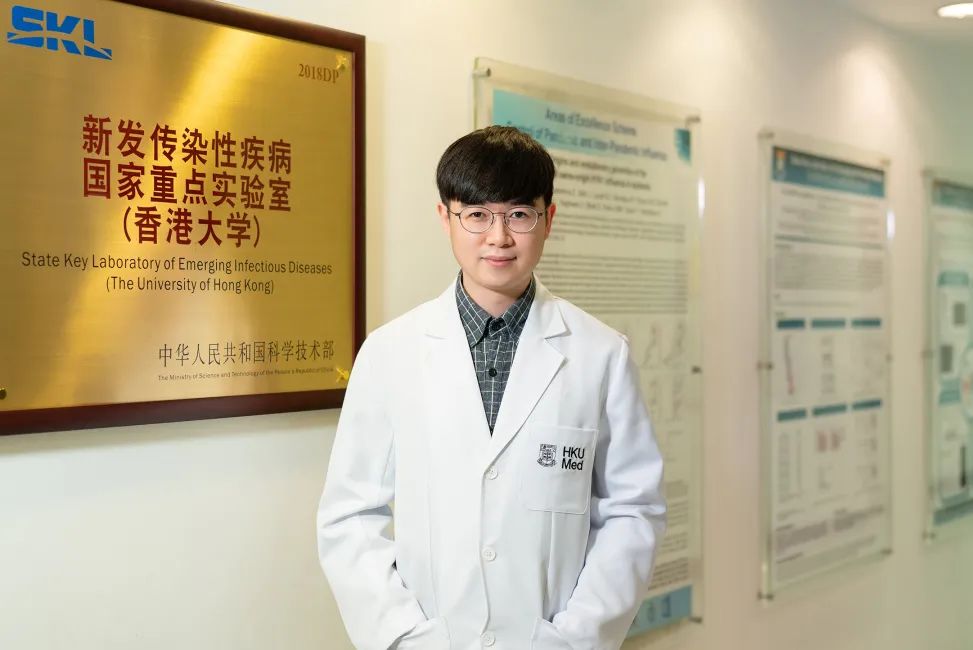
CAO Yi
Place of Origin: China
Progress: PhD Year 3
Supervisor: Prof LML Poon
挖掘流行病毒的致病機制,並將其應用於疾病的預防與治療,是曹翼的醫研目標。科研像一場未知的冒險,「我們用數據記錄在科研旅行中經歷的種種,然後把它呈現出來——這是我們的科學故事。」
他表示,在港大醫學院從事傳染性流感病毒研究有着得天獨厚的優勢,眾多學者擁有交叉學科的研究背景及深厚的研究經歷、完善的體系和完整的配套措施,有利於學生發揮所長,挖掘專業領域的價值所在。他希望拓展與豐富自己的研究背景與多學科背景的導師或朋友交流,書寫出與眾不同的科研故事。
June 2021
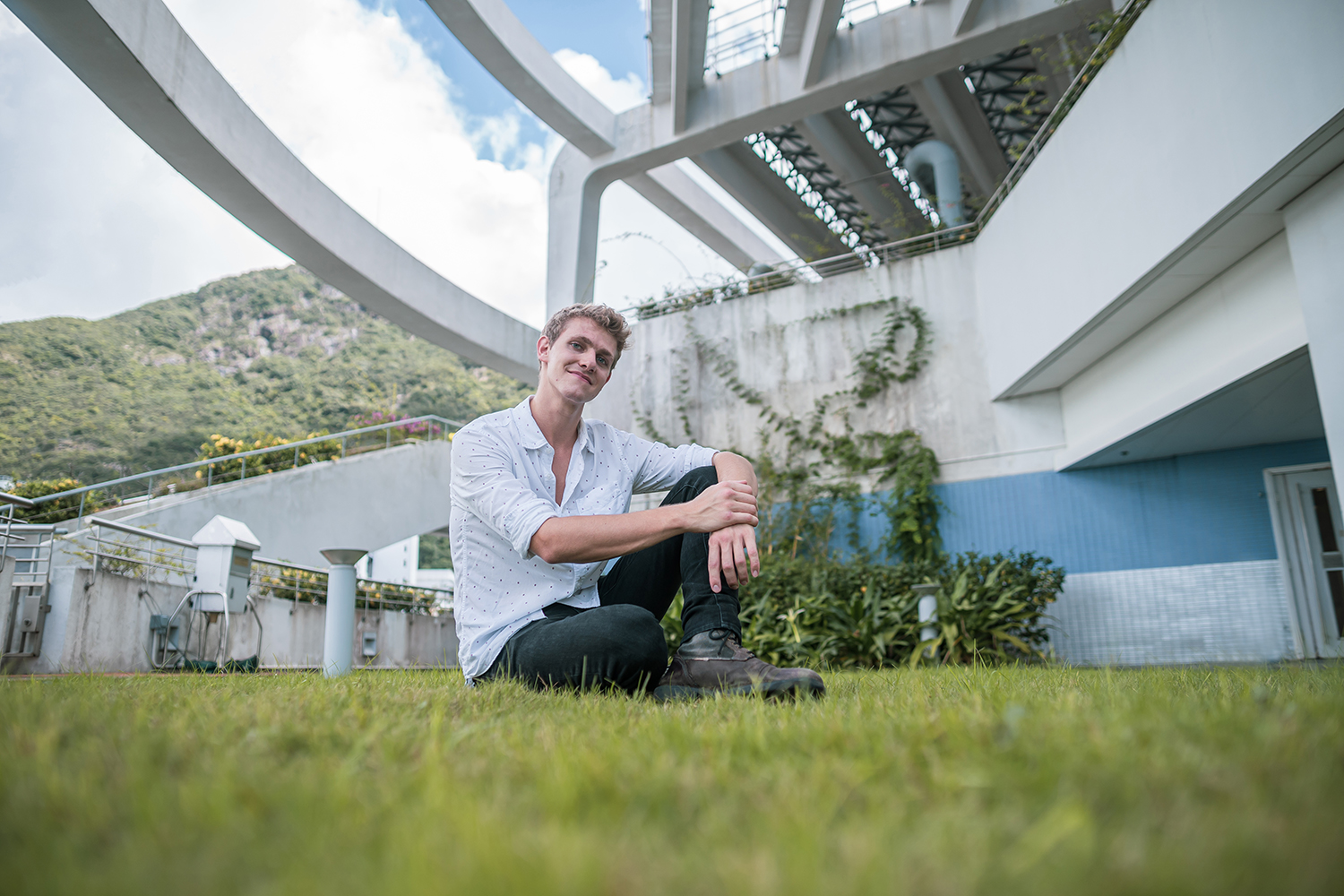
Brian WORTHINGTON
Place of Origin: USA
Progress: PhD Year 4
Supervisor: Dr MHC Zhu
“I've always been fascinated by animals. I grew up in a pretty rural area of New York State, living five minutes away from a zoo where I used to volunteer, so it’s a pretty full-circle feeling to now be researching outbreaks of infectious diseases at the human-livestock-wildlife interface.”
For Brian Worthington, a Year 4 PhD student, the biological diversity offered in the country parks and natural areas surrounding this concrete jungle has presented him many opportunities rarely found elsewhere.
"This opportunity opened a lot of doors in pursing my goal to study the inter-connections among humans, animals and their shared environment…I was able to work closely with veterinarians, ecologists, and conservationists at the human-wildlife interface which has been essential in helping me form appropriate research questions in conservation contexts."
November 2020
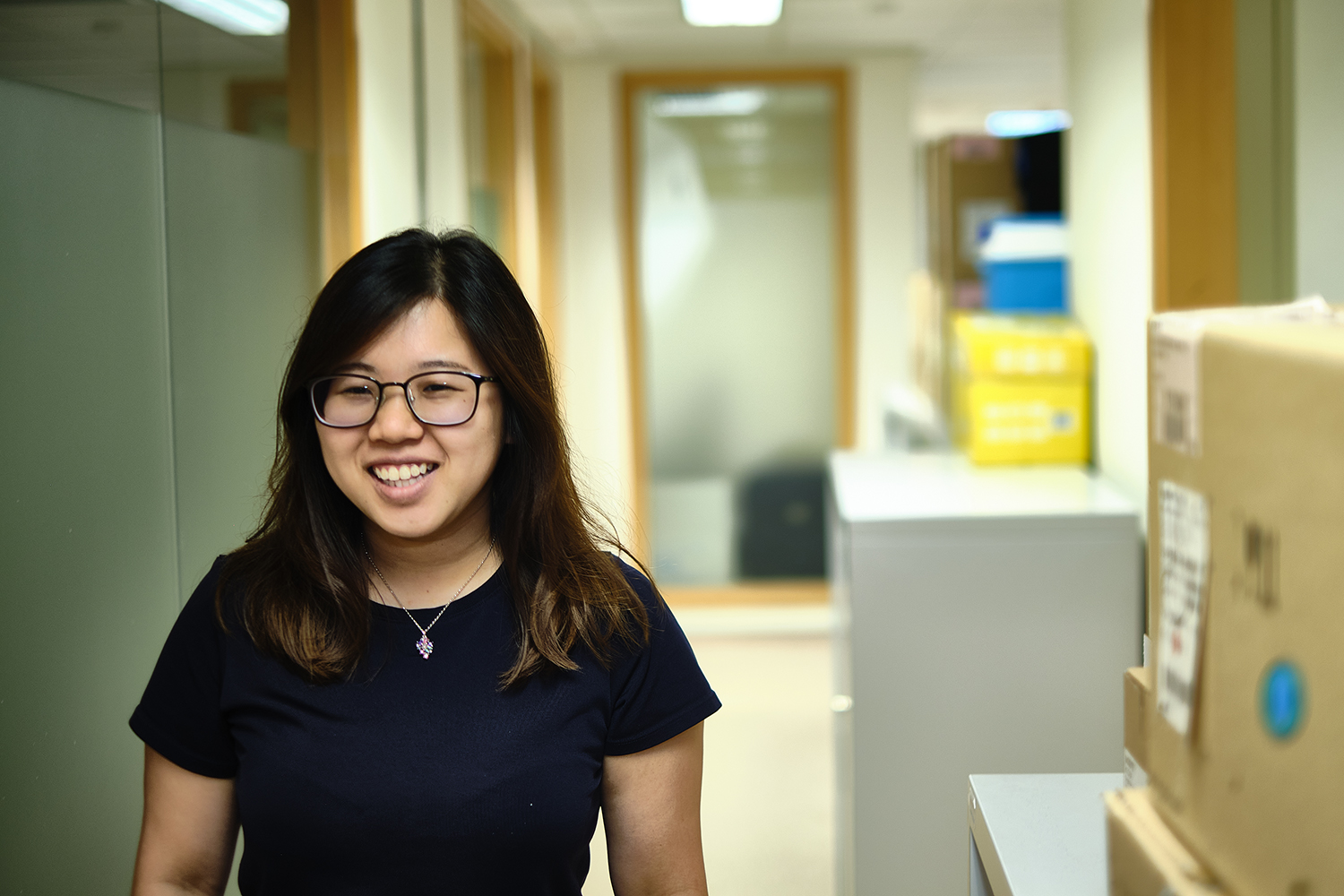
FONG Min Whui
Place of Origin: Malaysia
Progress: PhD Year 3
Supervisor: Professor BJ Cowling
“For research postgraduates, we would often write scientific reports for academia, but it's also important to communicate scientific ideas to the public effectively.”
Fong Min Whui, a second-year MPhil student, acknowledges that accurate information is our first line of defense in times of a pandemic; faced with the #COVID19 outbreak, the School of Public Health was tasked with bridging the world of academia with the general public.
"There were a lot of information going around…from the media and social media. We thought we can help to channel accurate information, or streamline information that we think are accurate, and then distribute it via our school webpage."
Whether it is to be in academia or policy-related works, Min Whui hopes to bring forward those transferable skills to the next step in her Public Health journey. "The knowledge exchange and teaching experience…I think it's very helpful for my professional growth as a whole.”
June 2020
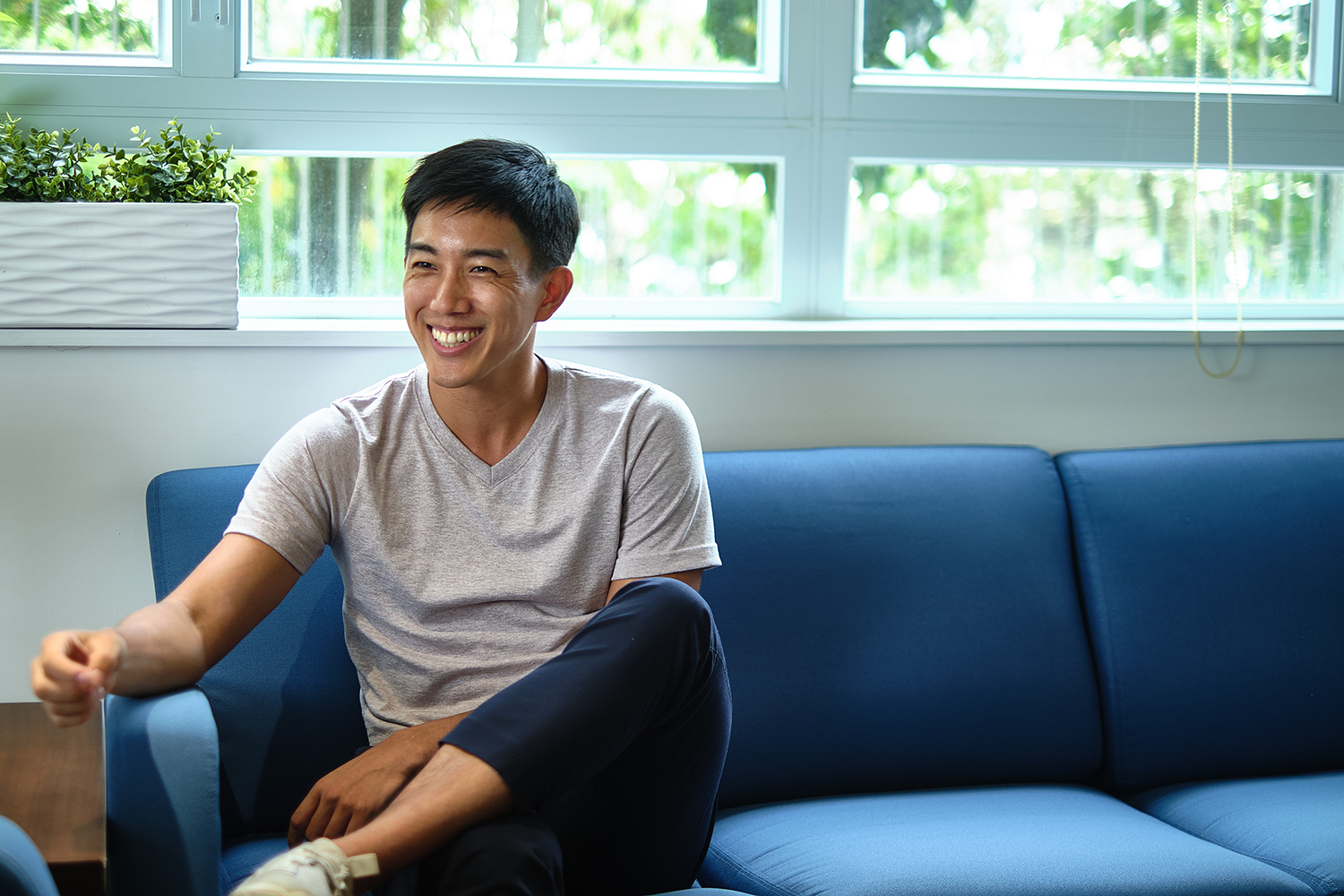
Jason YIN
Place of Origin: USA
Progress: PhD Year 2
Supervisor: Professor GM Leung
"Why is there so much... misinformation and fear?"
This is the question that Jason Yin, a first year PhD student at the School of Public Health, is trying to answer when he decided to jump on the “COVID19 train” after shifting his research focus following the outbreak.
"In the era of so much information, it's hard to make sense of it all. It's hard to make sense of it, in terms of the quantity, you just can't process it. The accuracy, you don't know if it's correct." The myriad of interesting cases prompted Jason to "look at how attention paid to a topic, and/or reporting amount/ media bias can track and frame pandemics and thereby impact both policies and resulting sentiments of publics."
Jason hopes that his contribution could help someone later down the line, emphasising that he's more of a vessel or tool to get this important work out there, “I don't really have a big platform, right? But I think it's responsible for those with a platform to use it for good […] you have the job to put information out there that is as objective as possible to counter this misinformation.”
May 2020
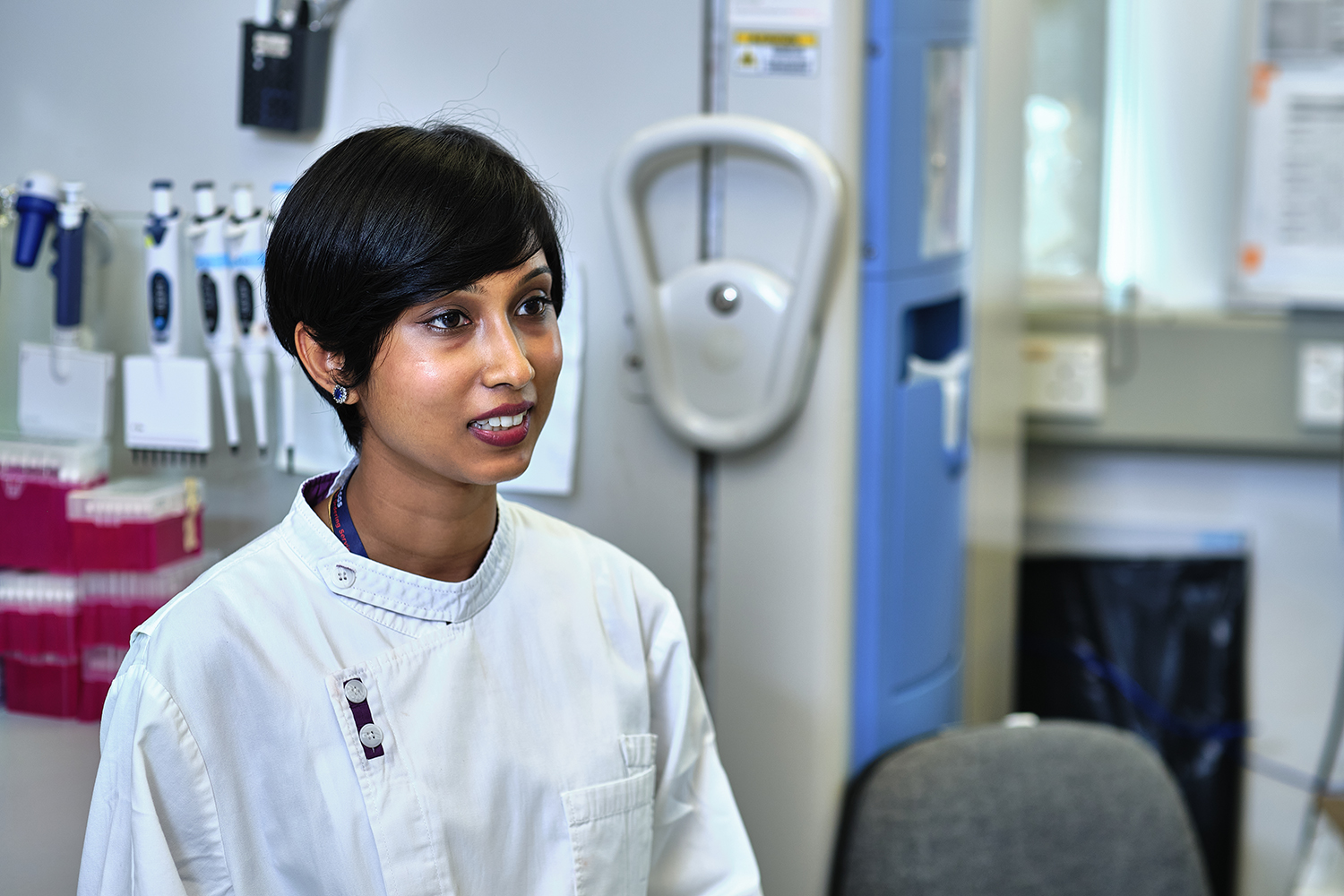
Pavithra DAULAGALA
Place of Origin: Sri Lanka
Progress: PhD Year 3
Supervisor: Professor JSM Peiris
“I want to contribute to a better vaccine approach against the influenza virus; a vaccine that would be long-lasting and more broadly protective… I certainly hope I’m contributing to that direction”.
Speaking on her aspirations as a postgraduate student, Pavithra Daulagala a second year PhD candidate in virology from Sri Lanka, cites her supervisor Prof Malik Peiris as a huge source of inspiration and motivation, “He is very well-known for his work on the influenza virus, and someone I’ve looked up to my entire postgraduate career”.
With a research focus on mapping mutations of the surface proteins of human flu viruses and understanding conserved sites for designing vaccines, her work has become all the more relevant with the ongoing coronavirus outbreak. “*Even though the postgraduate students in our team aren’t directly involved in the COVID19, the students have assisted the surveillance work or other research involving COVID-19 when required”*.
“It’s been very interesting being a part of a team that’s dedicated to working on coronavirus…you recognise the importance of the surveillance work after seeing how the pandemic has progressed around the world, and has definitely affected how I approach my current work”.
May 2020


Follow HKUMed